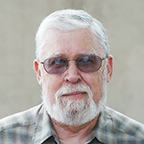New words are like old dogs
Published 1:12 pm Wednesday, January 15, 2025

- TJ Ray
By TJ Ray
Columnist
The word “lethologica” describes the state of not being able to remember the word you want. Perhaps somewhere in the language is a word that describes what we do when we have an attack of lethologica. Most commonly we substitute another word or make up a new one.
Other than air, the most important element we are surrounded by each day is language. (Perhaps it even manifests itself in our dreams when we vividly know the names of objects and places we’re dreaming of.)
According to the website languagemonitor.com, a new word is coined every 98 minutes. The English language passed the one millionth word in 2009. At any rate, when we are awake, we are surrounded by words.
Over time, sometimes a few months or years as opposed to centuries, words undergo mutation. What we construe a word to be at a given moment in history is what the word means, its origins meaningless to us.
Few of us think of the god Odin (or Woden) when we say “Wednesday” or holy flounder when we say “halibut.”
Sometimes the substitutions or the coinage of new words gives us linguistic heartburn.
Trending
In recent months such has been my misfortune.
It goes beyond the rather silly “my bad” instead of “my mistake.” For instance, there stands a four-star Coast Guard admiral announcing that “BP is our only modality for solving the problem.” Modality? What the deuce is he talking about? (And, yes, “deuce” once became a genteel alternative to “Devil” in such sentences.)
A likely venue for strange word choice is television talking-head shows. For example, on a business channel a fiscal genius opined that a certain government option would “incent” the market. Sounds almost pornographic. I’m glad it wasn’t people he wanted to have incented.
In a panel discussion one Sunday morning, one of the suits pointed out that “analyzation” of the situation would clarify the matter. No, I’m not going to suggest alternate explanations of that word.
A fertile field for far-fetched verbiage is TV sports analysts (particularly when given analyzation of something in a game). A great pass by a quarterback often reveals his “athleticism.” Isn’t it odd that the other 21 players on the field do not have this great endowment? I would have thought that this super word began as “athlete” and was amended to “athletic” which in turn became the new noun “athleticism.” Guess I was wrong.
Recently the World Cup Soccer tournament was enhanced by the number of players from several countries that possessed superb “physicality.” Not sure what to make of those other fellows on the field. None of them looked ethereal to me, leading me to wonder what the quintessential difference is between “physical” and “physicality.”
Worry should not surround this topic because, as one of the politicians much in the news points out, she will “refudiate” matters.
Ah, well, you know that I am living proof that it is fruitless to attempt to indoctrinate a superannuated canine with innovative behavior.





